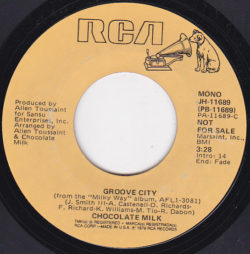Magazine
Mia X: No Limit’s First Lady Shares the Sounds that Shaped Her
Published: August 30, 2018
Last Updated: March 22, 2023
Mia X, who sold close to a million records during her 1990s tenure on Master P’s No Limit Records, grew up steeped in New Orleans culture, from the Mardi Gras Indian traditions she absorbed masking as a child with the Yellow Pocahontas, to the Creole and soul food recipes she learned in her grandmother’s kitchen, to the Crescent City funk, bounce, and rhythm and blues that swirled around her and informed the music she would make as one of hip-hop’s most celebrated lyricists. Mia spoke with NOLA Hiphop and Bounce Archive founder Dr. Holly Hobbs about the sounds that shaped her as an artist. This transcript has been lightly edited for length and clarity.
Tell me about your all-time favorite New Orleans records when you were growing up.
Well, most definitely Chocolate Milk’s “Groove City.” I will never forget that record. I was a little girl and the record sounded so good, it was hard for me to believe that people from New Orleans had made it. It was just such a great record, it’s still a great record . . . every time it’s played, people just sing it and vibe with it because it’s just one of those great, great New Orleans records. Another record that I really truly love is Irma Thomas’s “It’s Raining.” My grandma used to play that record, and I would sing it to [her]. It’s one of my favorite all-time records.
Another record, and I was twenty-one years old when this record came out, was T. T. Tucker and DJ Irv’s “Wha Dey At.” You know, that was the birth of bounce. That was a defining point in my life when I decided to start up music again to the point of recording it. Because I had never stopped writing, but I got serious about making a record after I heard Tucker and Irv’s “Wha Dey At.” I heard it in Ghost Town live. They got it pressed on a tape and the whole city was riding around playing that record. It didn’t matter what ward you was in, it didn’t matter where you was at, the city was playing that record. It didn’t matter what color you was, it didn’t matter what kind of club you had, everybody was playing that record. I just remember loving the whole impact of it, the change that it brought. It wasn’t sounding like nobody else, it was just them. So those are the three New Orleans records I never get tired of hearing, no matter what.
What about songs from outside New Orleans?
Of course New Orleans songs had the biggest impact on me. But songs from outside New Orleans had a huge impact as well on the culture here. One of my all-time favorite records from outside New Orleans is Trouble Funk’s “Drop the Bomb.” Every DJ that knows me knows to play that record. I also really love Patti LaBelle’s “Isn’t It a Shame” . . . I never get tired of hearing that. The first time I ever heard that, my mom put it on for one of my aunties . . . she must have been going through something, I don’t know—it was the seventies [laughs]. But I do know that the feeling of listening to them sing and hearing them hit those notes… I love that song to the point [that] when I was old enough, I got my own copy of the record and sang along to it every time I played it.
But the first song that made me want to be a rapper period was Sequence, “Funk You Up.” And that was one of my favorite all-time records because I heard girls doing it. For the first time. That was so important. I love all genres of music, all styles. But those are the records that people who know me know they have to play when I’m around.
Holly Hobbs earned her PhD in Ethnomusicology from Tulane University in New Orleans in 2015. In 2012, she founded the NOLA Hiphop and Bounce Archive, a digital archive of rap and bounce music and oral history housed at the Amistad Research Center. Hobbs has worked as a consultant in documentary film and for various music projects, including the Santuri Project based in Dar es Salaam, Tanzania. She is a contract fieldworker for the State of Louisiana, researching instrument-making traditions throughout the state for a Department of Tourism. Her writing has appeared in numerous publications, including Music Rising, the KNOWLA Encyclopedia of Music and Culture, Smithsonian Folkways, Southern Spaces, Louisiana Cultural Vistas, Uproxx, and more. She currently works as a Corporate Development Specialist for NPR/WWNO in New Orleans.
